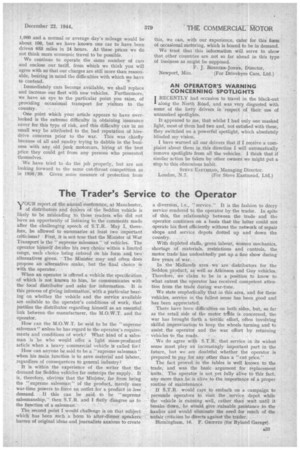The Trader's Service to the Operator
Page 35

If you've noticed an error in this article please click here to report it so we can fix it.
"TOUR report,of the annual conference, at Manchester, I of distributors and dealers of the Seddon vehicle is likely to be misleading to those readers who did not have an opportunity of listening to the comments made after the challenging speech of S.T.R. May I, therefore, be allowed to summarize at least iwo important criticisms? First, it is not true that the Minister of War Transport is the "supreme salesman" of vehicles. The operator himself decides his own choice within a limited range, such choice being entered on his form and two alternatives given. The Minister may and often does propose an alternative make, but the final choice is with the operator.
When an operator is offered a vehicle the specification of which is not known to him, he communicates with the local distributor and asks for information. It is this process of giving information, with a particular bearing on whether the vehicle and the service available are suitable to the operator's conditions of work, that justifies the distributor regarding himself as an essential link between the manufacturer, the M.O.W.T. and the operator.
How can the M.O.W.T. be said to be the "supreme salesman" unless he has regard to the operator's requirements and conditions of work? What kind of a salesman is he who would offer a light mass-produced article when a heavy commercial vehicle is called for?
How can anyone be said to be a "supreme salesman" when his main function is to save material and labour, regardless of consequences to general industry?
It is within the experience of the writer that the demand for Seddon vehicles far outstrips the supply. It is, therefore, obvious that the Minister, far from being the "supreme salesman" of the product, merely uses war-time powers to force an outlet for a product in less demand. If this can be said to be "supreme salesmanship," then S.T.R. and / flatly disagree as to the function of a salesman.
The second point I would challenge is on that subject which has been such a boon to after-dinner speakers barren of original ideas and journalists anxious to create a diversion, i.e., "service." It is the fashion to decry service rendered to the operator by the trader. In spite of this, the relationship between the trade and the operator continues on a basis thatthe latter could not operate his fleet efficiently without the network of repair shops and service depots dotted up and down the country.
With depleted staffs, green labour, women mechanics, shortage of materials, restrictions and controls, the motor trade has undoubtedly put up a fine show during five years of war.
In the Midlands area we are distributors for the Seddon product, as well as Atkinson and Guy vehicles. Therefore, we claim to be in a position to know to what extent the operator has received competent attention from the trade during war-time.
We state emphatically that in this area, and for these vehicles, service in the fullest sense has been good and has been appreciated.
There have been difficulties on both sides, but, so far as the retail side of the motor trIlde is concerned, the war has brought forth a terrific effort, often involving skilful irnprovization to keep the wheels turning and to assist . the operator and the war effort by returning vehicles to the roads.
We do agree with S.T.R. that service in its widest sense must play an increasingly important part in the future, but we are doubtful whether the operator is prepared to pay for any other than a "cut price."
The fact proved in the tables is well known to the trade, and was the basic argument for replacement units. The operator is not yet fully alive to this fact, any more than be is alive to the importance of a proper routine of maintenance.
If S.T.R. would care to embark on a campaign to persuade operators to visit the service depot while the vehicle is running well, rather than wait until it breaks down, he would give valuable pssistance to the haulier and would eliminate the need for much of the unfair criticism he directs against the trader.
Birmingham, 16. F. GRIFFIN (for Ryland Garage).




















































